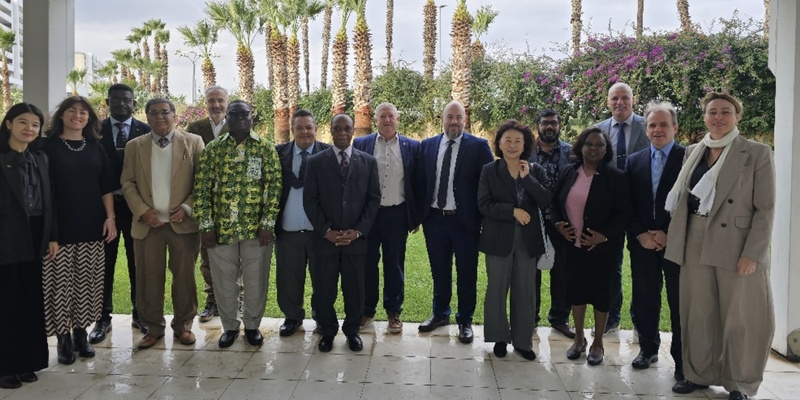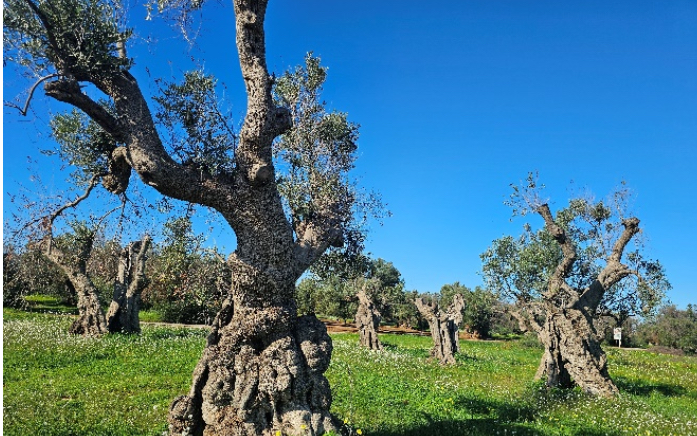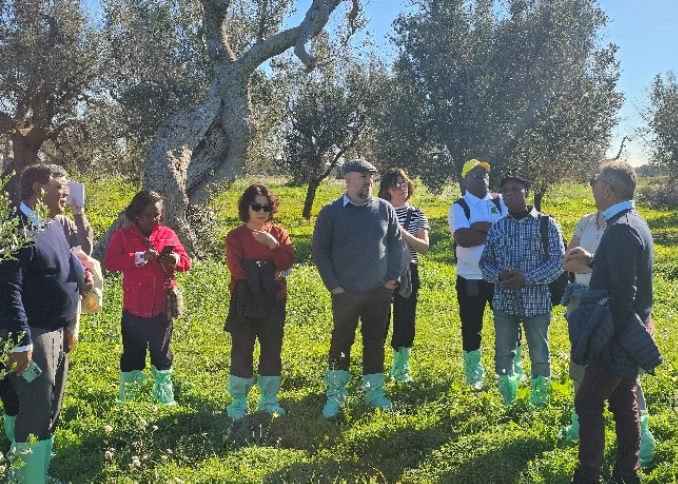Le Comité chargé de la mise en œuvre et du renforcement des capacités de la CIPV fait progresser l’appui à la mise en œuvre des normes phytosanitaires
Posted on lun, 24 Nov 2025, 09:00

Membres du Comité chargé de la mise en œuvre et du renforcement des capacités et personnel du Secrétariat de la CIPV
Le renforcement des systèmes phytosanitaires à l’échelle mondiale et des capacités nécessaires pour mettre en œuvre les normes phytosanitaires a, une fois encore, été au cœur des discussions, lors de la deuxième réunion annuelle du Comité chargé de la mise en œuvre et du renforcement des capacités, qui s’est tenue du 11 au 14 novembre à Bari, dans le sud de l’Italie.
À mi-parcours du Cadre stratégique 2020-2030 de la CIPV, le Comité a discuté des mesures à prendre pour aider les parties contractantes à la Convention internationale pour la protection des végétaux (CIPV) à mettre en œuvre efficacement les normes internationales pour les mesures phytosanitaires (NIMP) et à renforcer les systèmes phytosanitaires afin de prévenir, gérer, maîtriser et résorber les apparitions de foyers d’organismes nuisibles. Les principaux sujets abordés comprenaient l’appui à l’évaluation des capacités phytosanitaires (ECP), le développement de l’apprentissage phytosanitaire grâce au Campus de la CIPV sur la santé végétale, la préparation de la troisième enquête générale de la CIPV (2026), la mise en œuvre de la solution ePhyto de la CIPV et le renforcement du suivi et du signalement des nouveaux organismes nuisibles grâce aux systèmes d’alerte et d’intervention en cas d’apparition de foyers d’organismes nuisibles (POARS).
Progrès en matière de formation phytosanitaire et de facilitation du commerce
Enrico Perotti, Secrétaire de la CIPV, a salué les travaux du Comité: «Le travail à accomplir est aussi ambitieux qu’indispensable pour préserver l’environnement et la sécurité alimentaire. Les défis auxquels nous sommes confrontés – nouveaux organismes nuisibles, innocuité du commerce et besoin de systèmes phytosanitaires résilients – exigent que nous continuions d’innover, de collaborer et d’agir avec détermination.»
Il a souligné le caractère novateur du Campus de la CIPV sur la santé végétale. Le portail en ligne est actuellement disponible en anglais et en français, et une version espagnole donnant accès aux cours gratuits et à d’autres supports pédagogiques sera lancée en 2026. M. Perotti a exhorté les membres du Comité à encourager les organisations nationales de la protection des végétaux (ONPV) à suivre ces cours, qui visent à améliorer le travail quotidien des professionnels de la santé des végétaux et à combler les lacunes en matière de connaissances phytosanitaires. Le Campus compte actuellement 15 000 apprenants inscrits, 15 cours en ligne et plus de 20 guides pratiques portant sur plusieurs thèmes liés à la santé des végétaux et aux questions phytosanitaires. En collaboration avec le Groupe directeur ePhyto et le Groupe de réflexion de la CMP sur les conteneurs maritimes, de nouveaux cours seront mis en ligne pour faciliter la mise en œuvre de la solution ePhyto de la CIPV et l’inspection des conteneurs maritimes. Ces cours visent à favoriser la diffusion et l’utilisation de cet outil numérique, en vue d’améliorer le commerce des végétaux et de renforcer les inspections phytosanitaires. À ce jour, 97 pays utilisent l’outil pour échanger des ePhytos, avec plus de 250 000 transactions par mois, soit une augmentation de 30 pour cent par rapport à 2024. «Il ne s’agit pas simplement d’un progrès technique, mais d’un véritable moteur économique à l’échelle mondiale», a expliqué M. Perotti.
Comprendre l’impact des mesures phytosanitaires et leurs dimensions sociales
Le Comité a examiné l’impact concret de ses travaux lors d’une visite d’oliveraies à Brindisi, organisée en collaboration avec le Centre international de hautes études agronomiques méditerranéennes (CIHEAM) de Bari et le Service phytosanitaire des Pouilles (APPS). Ils ont évalué les dommages causés par Xylella fastidiosa, une bactérie qui affecte des cultures importantes sur le plan économique telles que l’olive, en obstruant leurs vaisseaux. En Europe, c’est dans le sud de l’Italie, où elle a détruit des millions d’arbres centenaires et a menacé l’industrie de l’huile d’olive, que Xylella fastidiosa a été signalée pour la première fois. Les membres ont ainsi appelé à améliorer la préparation et les interventions face aux apparitions de foyers d’organismes nuisibles, en soulignant les difficultés rencontrées dans la mise en œuvre des mesures phytosanitaires, comme la réticence du public à abattre les arbres, qui a favorisé la dissémination des organismes nuisibles. Ils ont également souligné la nécessité de renforcer la sensibilisation du public via les principales parties prenantes afin de favoriser l’acceptation des mesures phytosanitaires.


Garantir une mise en œuvre efficace
Dans la continuité du message du Secrétaire de la CIPV, le Président du Comité, Dominique Pelletier, a souligné que la CIPV devait passer de «la survie à l’essor». Il a rappelé le problème récurrent de l’insuffisance des financements destinés aux activités de base de la CIPV en matière de mise en œuvre et de renforcement des capacités, ce qui compromet l’exécution des activités programmées. M. Pelletier a également souhaité la bienvenue à Nitesh Datt (Fidji), représentant la région Pacifique sud-ouest, et à Anna Maria D’Ongia (Italie), représentante du CIHEAM, qui participaient pour la première fois à une réunion du Comité.
Afin de renforcer la mise en œuvre, le Comité a recommandé que la CMP envisage les actions suivantes: établir des postes réguliers financés au sein de l’Unité de la facilitation et de la mise en œuvre; allouer davantage de fonds aux activités prioritaires telles que l’élaboration de guides et de supports de formation; inciter les parties contractantes à accroître leurs contributions financières et en nature; promouvoir le Campus de la CIPV sur la santé végétale et encourager les appuis financiers ou en nature pour la traduction; et consacrer davantage de temps à l’examen des questions de mise en œuvre lors des ateliers régionaux de la CIPV.

